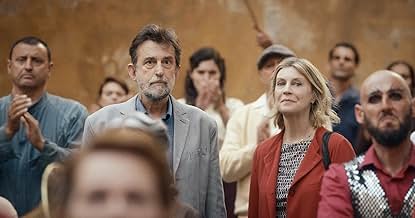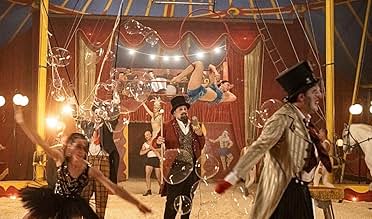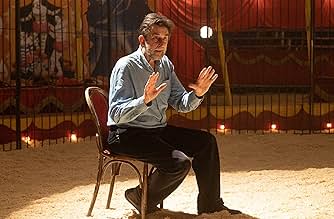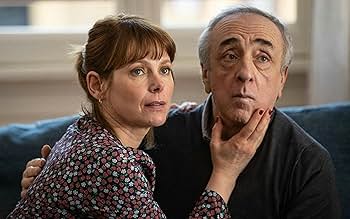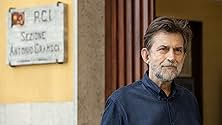ÉVALUATION IMDb
6,7/10
3,8 k
MA NOTE
Giovanni réalise, au milieu de mille incertitudes, un film sur la vie d'un intellectuel communiste en 1956, année fatidique de l'invasion soviétique de la Hongrie. Entre-temps, son mariage e... Tout lireGiovanni réalise, au milieu de mille incertitudes, un film sur la vie d'un intellectuel communiste en 1956, année fatidique de l'invasion soviétique de la Hongrie. Entre-temps, son mariage entre en crise.Giovanni réalise, au milieu de mille incertitudes, un film sur la vie d'un intellectuel communiste en 1956, année fatidique de l'invasion soviétique de la Hongrie. Entre-temps, son mariage entre en crise.
- Prix
- 2 victoires et 21 nominations au total
Avis en vedette
A Brighter Tomorrow, directed by Nanni Moretti, is a deeply introspective work that grapples with the challenges of aging, personal relationships, and the fading ideals of the past. The film weaves a meta-narrative as Moretti portrays a filmmaker struggling to complete a movie about the Italian Communist Party during the USSR invasion of Hungary in 1956, while also navigating the complexities of his personal life.
Moretti's performance is poignant, as he channels his characteristic wit and self-awareness to reflect on the inevitability of change. Margherita Buy and Silvio Orlando deliver nuanced portrayals, adding depth to the story's emotional layers. The interplay between Moretti's fictional and real-life personas creates a dialogue with the audience, blending humor and melancholy in a way that feels uniquely his own.
The film excels in its quieter moments, such as a scene where a reluctant young couple watches *La Dolce Vita*, a symbolic nod to the contrasts between generational attitudes. Moretti resists succumbing to nostalgia, instead embracing a tempered optimism that acknowledges the wounds of the past while looking toward the future. The sun may continue to rise, but it does so over landscapes marked by the scars of time.
A Brighter Tomorrow is not without its flaws-some viewers may find its self-referential approach too insular-but it remains a compelling exploration of resilience and the enduring power of art and connection.
Rating: 8/10 - A thoughtful and bittersweet meditation on change and perseverance.
Moretti's performance is poignant, as he channels his characteristic wit and self-awareness to reflect on the inevitability of change. Margherita Buy and Silvio Orlando deliver nuanced portrayals, adding depth to the story's emotional layers. The interplay between Moretti's fictional and real-life personas creates a dialogue with the audience, blending humor and melancholy in a way that feels uniquely his own.
The film excels in its quieter moments, such as a scene where a reluctant young couple watches *La Dolce Vita*, a symbolic nod to the contrasts between generational attitudes. Moretti resists succumbing to nostalgia, instead embracing a tempered optimism that acknowledges the wounds of the past while looking toward the future. The sun may continue to rise, but it does so over landscapes marked by the scars of time.
A Brighter Tomorrow is not without its flaws-some viewers may find its self-referential approach too insular-but it remains a compelling exploration of resilience and the enduring power of art and connection.
Rating: 8/10 - A thoughtful and bittersweet meditation on change and perseverance.
I liked the film as a whole, Moretti is certainly someone who loves cinema and in general all the art of old Italy, you can see everything in the protagonist played and representing himself, but I can't fully understand the intent because I don't know well the real communist ideologies or the Soviet ones or the Italian Communist Party. But I can appreciate the desire to create well-made characters, in a world where cinema is produced only by big houses that do not grasp the essence of art in any way the protagonist lives his life completely in art, in his own art and in the art of others, and when he gets the chance he analyzes art in all the ways it's possible to do it and all he does is bring his art back to the screen, no matter the money, just instinctively as an artist, it's the first film I've seen by this director and consequently I don't know if it's below or above average compared to the others, but I give it a 7 because it's a film that has soul and the desire to tell something.
A film that's different from the usual, almost a metafilm into which other films are interwoven. Moretti talks to us about history, politics, love, violence, and physical decay. In some ways, it's also very autobiographical. Despite the many themes the director has inserted, everything flows smoothly towards an ending that leaves some threads of hope for the audience. I left the cinema feeling happy, despite everything. For this, I want to thank Moretti. At some point, it wasn't so obvious. The actors' performances were also great, especially those of Silvio Orlando and Margherita Buy, as well as Amalric's. In short, it's the usual Moretti film that never disappoints and I believe can be appreciated not only by an Italian audience but also an international one.
In "The Sun of the Future," Nanni Moretti reinvents himself as a consummate filmmaker, expressing his views on the political world, streaming platforms, contemporary cinema, his personal life, and his relationship with his partner more forcefully than ever before. This astonishing Italian comedy delves into the critique of all these aspects through the film that the main character (played by Moretti) is filming.
Compared to "Dear Diary" (1993), which was more personal and, if I may say so, somewhat egocentric, "The Sun of the Future" stands out for being exceptionally political and romantic. This film perfects the autobiographical approach the director explored in his previous work.
The film serves as a starting point for an important debate about independent cinema and the strategies it must employ to survive in the streaming era. Moretti criticizes the current trend in which movies are expected to lay out their entire plot within the first two minutes, an illogical formula in his perspective and characteristic of the senseless surge of streaming in recent years.
Ultimately, "The Sun of the Future" is a work imbued with an underlying sentiment: love. Love is the driving force and the brake in the entire narrative, a crucial element that can change things for better or for worse.
Compared to "Dear Diary" (1993), which was more personal and, if I may say so, somewhat egocentric, "The Sun of the Future" stands out for being exceptionally political and romantic. This film perfects the autobiographical approach the director explored in his previous work.
The film serves as a starting point for an important debate about independent cinema and the strategies it must employ to survive in the streaming era. Moretti criticizes the current trend in which movies are expected to lay out their entire plot within the first two minutes, an illogical formula in his perspective and characteristic of the senseless surge of streaming in recent years.
Ultimately, "The Sun of the Future" is a work imbued with an underlying sentiment: love. Love is the driving force and the brake in the entire narrative, a crucial element that can change things for better or for worse.
#Cannes2023# A film by a white old male director that far exceeded my expectations. It can be considered as a self-reflection and self-deprecating work from the usually narcissistic Moretti. He directed and acted in a movie that explores his journey from denial to ultimately admitting his creative decline, the irrelevance of his themes (at least to a diminishing audience), his inability to work without his wife "assistant" and the growing resentment from his crew towards his mansplaining . In the end, he also concludes with a false sense of hope, summarizing it as a lament for the leftist movements of the 1950s and acknowledging his inability to find a good ending. This self-analysis and sincere display of vulnerability moved me. There are countless directors in their old ages who have run out of creative juices, but not many can be this candid. Additionally, there are Fellini-esque elements throughout the film, with circus motifs and ensemble dancing, adding a touch of delightful nostalgia. @ Cannes Cineum Aurore.
Le saviez-vous
- AnecdotesSelected to compete for the Palme d'or in the 2023 Cannes Film Festival. This is the ninth time that a film from director Nanni Moretti is selected at Cannes; every movie he made since "Caro diario" has been at Cannes, he even won the Palme d'or in 2001 with "The Son's Room."
- ConnexionsFeatures La dolce vita (1960)
Meilleurs choix
Connectez-vous pour évaluer et surveiller les recommandations personnalisées
- How long is A Brighter Tomorrow?Propulsé par Alexa
Détails
- Date de sortie
- Pays d’origine
- Langues
- Aussi connu sous le nom de
- A Brighter Tomorrow
- Lieux de tournage
- sociétés de production
- Consultez plus de crédits d'entreprise sur IMDbPro
Box-office
- Budget
- 12 284 110 € (estimation)
- Brut – à l'échelle mondiale
- 6 668 544 $ US
- Durée
- 1h 35m(95 min)
- Couleur
- Rapport de forme
- 1.85 : 1
Contribuer à cette page
Suggérer une modification ou ajouter du contenu manquant

![Regarder Trailer [OV]](https://m.media-amazon.com/images/M/MV5BZjUxOGY3NjUtN2RiNy00NDlkLWE4MGYtZjkxMTU2MmNmOTBmXkEyXkFqcGdeQXRyYW5zY29kZS13b3JrZmxvdw@@._V1_QL75_UX500_CR0)

